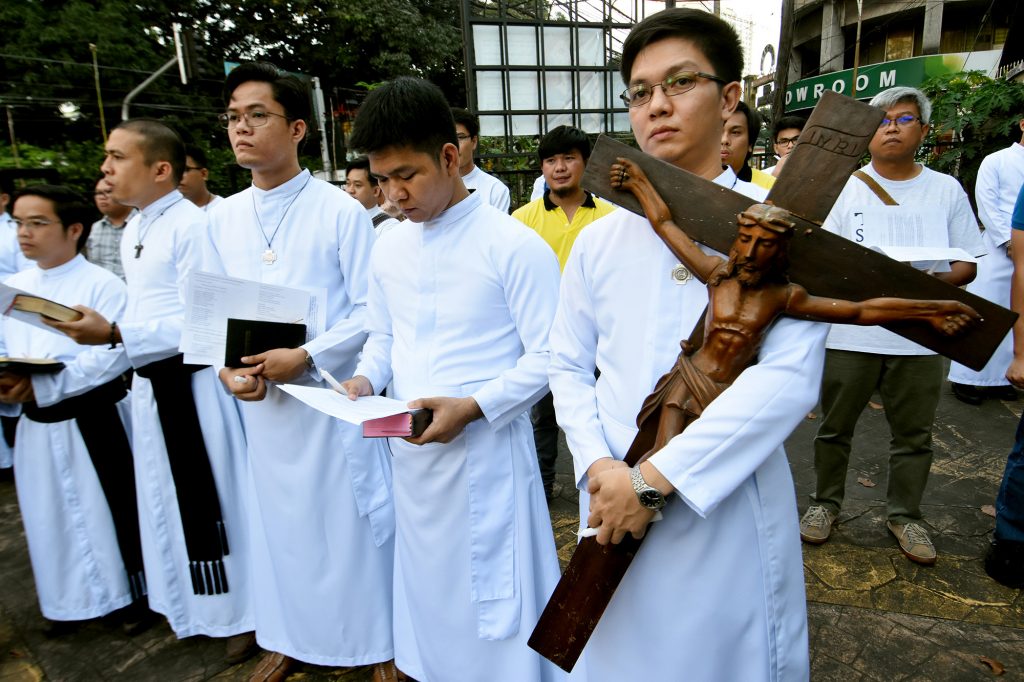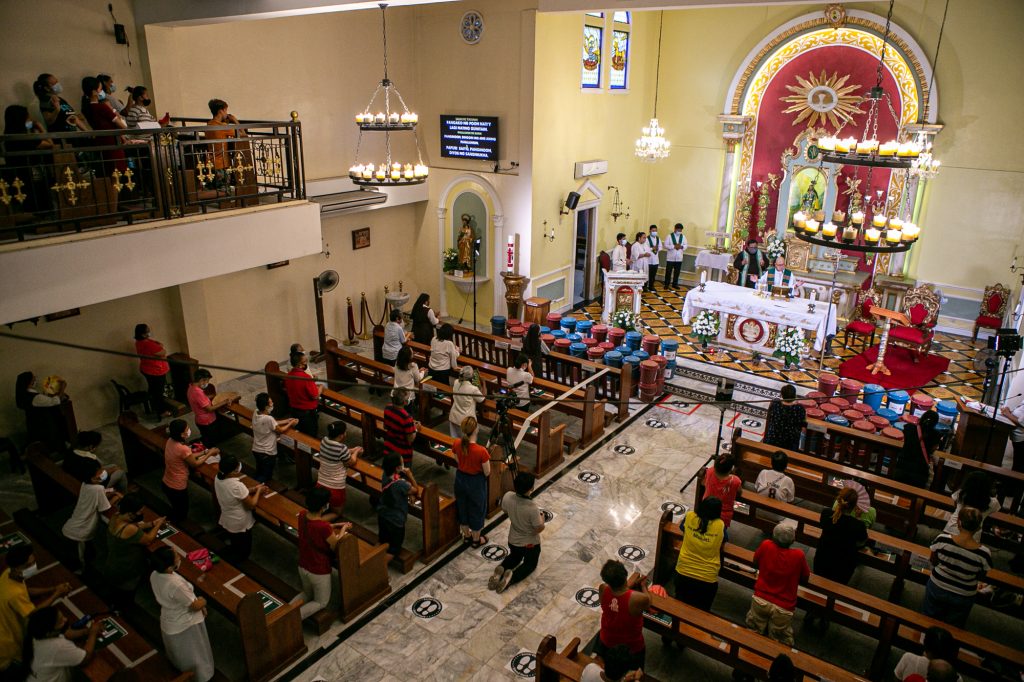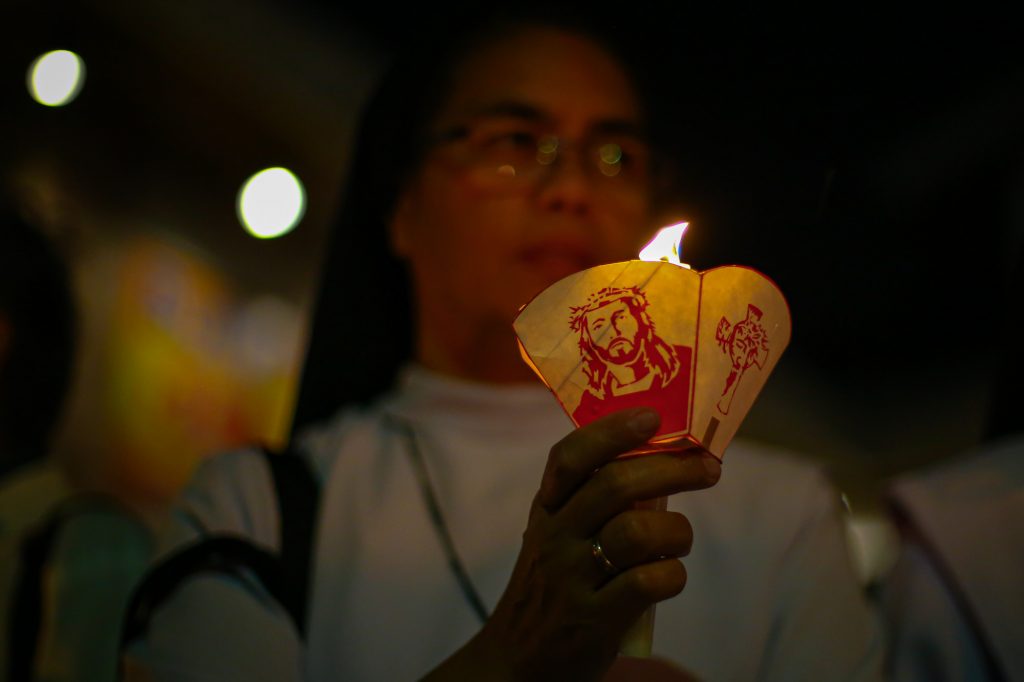
The present pandemic, however, reminds us that there are no differences or borders between those who suffer. We are all frail, all equal, all precious. May we be profoundly shaken by what is happening all around us. The time has come to eliminate inequalities, to heal the injustice that is undermining the health of the entire human family! Let us learn from the early Christian community described in the Acts of the Apostles. It received mercy and lived with mercy. “All who believed were together and had all things in common; and they sold their possessions and goods and distributed them to all, as any had need” (Acts 2:44-45). This is not some ideology. It is Christianity. – Homily of His Holy Father Pope Francis on Divine Mercy Sunday, April 19, 2020
We, the 105 major religious superiors and delegates of the first online general assembly of the Association of Major Religious Superiors in the Philippines, have gathered for two days to reflect on the theme, “Shepherding as consecrated persons in the midst of pandemic.”
We have looked back at what we have done with two major catastrophes in our lives – Taal Volcano Eruption and COVID19. We have responded with acts of mercy and compassion. To address social injustices, AMRSP has developed and tempered its own creative methods integrating Christian traditions to express our demands for good governance.
We have listened intently to the sharing of Fr. Daniel Franklin Pilario, CM as he delved into the challenges of “Doing Theology and Ministry in a Time of Pandemic”.
We identified ourselves with the sufferings and pain in our midst. Sickness and hunger are real. Corruption remains endemic. And the response is to instill fear among our people. We seem to be a nation at war with its own people.
Social distancing, face masks, lockdowns, different modes of quarantine have brought isolation and, seemingly, apathy into our lives.
Even our churches were closed and we have been forced to say Mass online instead.
Christians and Catholics have responded in different ways, with some looking at the pandemic as God’s punishment or will.
But there are prophets and disciples who have responded with acts of solidarity with the least, last and lost. They followed Christ’s imperative to “feed my lambs”.
We have confronted the question of association as the proper term for our group of religious superiors. We have been challenged to be more inclusive and faithful to our vision and mission.
Most Reverend Pablo Virgilio David posed questions for our collective discernment and action, in his talk entitled “Shepherding as consecrated persons in the midst of pandemic – Lord what must we do? (Mark 10:17)”.
The pandemic has shattered the façade of our egos enamored with images of power and influence, of a hierarchy of honor and dignity.
Where is God in the midst of our suffering and trials? Natutulog ba ang Diyos?
And we resoundingly answered: God is not dead, God is not asleep.
God is with us.

As we navigate these new waters while remaining faithful disciples and apostles of Christ, we are called to:
AMRSP RESPONSE AND ENGAGEMENT
In coordination with our shepherds who share in the ministry of our Good Shepherd, we consecrated persons promise to help build a synodal Church, a Church that listens and walks with the least, the last and the lost; a synodal Church that is a field hospital, spaces of love, compassion and mercy; a synodal Church that is flexible and rethinks constantly of the “priest-centered” Church, and recognizes the role of the laity in the life of the faith community, moving from grand churches to small ecclesial communities; a Church that directly addresses the growing inequality between the rich and the poor.
As servant-leaders and stewards of God’s gifts, we also promise to care for Mother Earth our common home, to sustain it at all costs, since we are facing a bigger problem of the disastrous climate change.
In view of these challenges, to make the Church presence felt in the world and in the daily lives of all peoples, specially the poor, homeless, unemployed, and disadvantaged, we fully commit to Pope Francis’ Ten-Year Laudato Si Action Platform on Total Sustainability:
Response to the cry of the Earth
Work toward carbon neutrality through greater use of clean renewable energy and reduced fossil fuel use; support efforts to protect and promote biodiversity and guarantee water access for all.
Response to the cry of the poor
Defend human life from conception to death and all forms of life on Earth, while giving special attention to vulnerable groups such as indigenous communities, migrants and children at risk of trafficking and slavery. And work towards lessening the class, race and gender inequalities.
Ecological economics
Sustainable production, fair trade, ethical consumption and investments, investments in renewable energy, divestment from fossil fuels and limiting any economic activity harmful to the planet or people.
Adoption of simple lifestyles
Reduce use of energy and resources, avoid single-use plastics, adopt a more plant-based diet, reduce meat consumption and increase use of public transportation.
Ecological education
Redesign curricula around integral ecology, create ecological awareness and action, promote ecological vocation with young people and teachers.
Ecological spirituality
Recover a religious vision of God’s creation, promote creation-centered liturgical celebrations, develop ecological catechesis and prayers and encourage more time in nature.
Community action
Emphasis on community involvement and participatory action around creation care at all levels of society by promoting advocacy and grassroots campaigns.
“Let us welcome this time of trial as an opportunity to prepare for our collective future, because without a vision that embraces everyone, there will be no future for anyone.” – Pope Francis, op. cit.

OUR OPPORTUNITIES IN THIS TIME OF TRIAL
In closing, let us be reminded of the challenges we face.
Bishop [David] asks us:
- How do we assist people with anxiety attacks, who are depressed, who lose hope, who suffer from abuse, stress, trauma and can’t afford a psychiatrist? Can we be more daring in inventing new ministries AS NEEDED, and letting old and irrelevant ministries die a natural death?
- How prepared are we to reach people, albeit virtually? People are hungering, not just for physical but for spiritual food. How do we provide this nourishment in a time of pandemic?
- At the forefront of our social service ministries were the disaster response ministries doing relief work, distributing food packages, food vouchers, cooked meals to the poor and disadvantaged. How do we infuse it with a new impetus?
- How is our restorative justice ministry dealing with how quarantine has disadvantaged the poor? While they are on survival mode, the authorities consistently tend to bully the poor who have no way of asserting their human rights. Mang Dodong’s story has become classic. They have arrested thousands of people whose only crime is violation of quarantine regulations because they are looking for food or a means of livelihood.
- How do we respond to the need for anointing, last rites for the COVID patients, funeral blessings, counseling people who have lost family members? Is there a possibility of having a common celebration in memory of those who have died, like they did in Italy?
- Fr. Danny, meanwhile challenged us to:
- Rethink theology, the Church, and also the virtual (find God in the real and the corporeal); our liturgies; compassion, resistance and justice; and the role of religious and clergy.
- The way to solidarity, to help ease the suffering of the people beyond our walls is to listen to them.
- Take courage, despite fear.
- Take care, amidst the danger we face on the front lines of this pandemic.
- Shepherding as consecrated persons in the midst of this pandemic requires our deep introspection with the assurance that the Lord is with us.
Acknowledgments
We acknowledge and thank our resource persons (Fr. Daniel Franklin Pilario, CM; Fr. Elias Ayuban, Jr., CMF; and Most Reverend Pablo Virgilio David, D.D.) for sharing with us their wisdom and experience, while issuing us challenges to guide our discernment and growth.
We also recognize, with gratitude, the contributions of our co-Chairpersons Sr. Marilyn A. Java, RC (who welcomed us all and set the tone for our Assembly) and Fr. Cielito R. Almazan, OFM (who delivered the Chairperson’s Report) – both of whom also commented on the drafts of this Statement; and our co-Treasurers Sr. Mirasol Navidad, RSCJ and Br. Daryl Jusay, OH (who delivered our Financial Report).
We also thank our Co-Executive Secretaries (Fr. Angel Cortez, OFM and Sr. Happy Montecillo, DSA) who helmed and facilitated the event, as well as the rest of the Secretariat who provided them support: the Documentation & Statement Team (Odalie Adiao-Garcia, Emmanuel Amistad, and Terê Navalta), Finance Team (Emie Baes Castro, Ebbey Pascual-Lagmay and Mildred dela Cruz), Media Team (Christian Joshua Ancheta, John Benedict Marcos, Andrea Poblacion and Bro. Aaron Ricardo Veloso), and Registration and Admin Team (Bernard Nuguid, Veron Ojario-Rodrigo, and Leo Parpados).
Last but not least, we thank WeGen management for their support for AMRSP and this online General Assembly in particular.
AMRSP Joint Board, Secretariat & Participants
First AMRSP Online General Assembly
October 1, 2020
Source: Licas Philippines
0 Comments